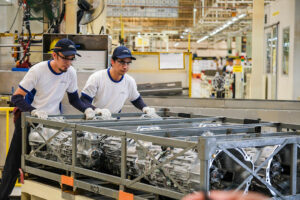PHL urged to ramp up competitiveness amid Trump tariff reprieve

By Justine Irish D. Tabile, Reporter
THE PHILIPPINES should boost efforts to improve its competitiveness in attracting investments amid the 90-day pause on US President Donald J. Trump’s higher reciprocal tariffs.
“It is difficult to read Trump’s mind. Who knows, there might be another ‘shocker’ after the 90-day recess,” said Robert M. Young, president of the Foreign Buyers Association of the Philippines, in a Viber message on Thursday.
“In the meantime, let’s all get back to work and sharpen our pencils to re-evaluate and shape up to be able to compete globally. As it is, the Philippines is considered the last option due to the higher cost of doing business,” he added.
Mr. Young said it is high time for the Philippines to ramp up its capabilities as competition heats up with other markets.
“The Philippines’ focus should be on the major categories like agricultural products, electronics, minerals, and manufactured items like garments and apparel,” he added.
Mr. Trump on Wednesday announced a 90-day pause on the higher reciprocal tariffs on most of the US’ trading partners, including members of the Association of Southeast Asian Nations (ASEAN).
The US slapped ASEAN countries with some of the highest tariffs. Cambodia is facing a 49% tariff, followed by Laos (48%), Vietnam (46%), Myanmar (44%), Thailand (36%), Indonesia (32%), Malaysia (24%), and Brunei (24%).
The Philippines was slapped with a 17% tariff, which is among the lowest in the region, only second to Singapore’s baseline rate of 10%.
With the 90-day pause now in place, all countries including the Philippines will face a blanket 10% duty until July.
Meanwhile, Philippine Chamber of Commerce and Industry Chairman George T. Barcelon said that the business sector is still adopting a wait-and-see stance.
“[This pause] is a good development … This period would give us some time to clarify the matter of if and when they will reimpose, whether it is across-the-board coverage or select goods still,” said Mr. Barcelon in a phone interview.
He said that the Philippines’ original 17% rate is a comparative advantage that makes the country attractive for both foreign direct investments and people shifting orders to countries with lower rates.
“But we have to be prepared. Because if we don’t have the capacity, this comparative advantage will be for naught,” he said.
“This 90-day pause can be used to clarify certain things and also to study what the opportunities are in this whole issue of reciprocal tariffs across the world,” he added.
ASEAN RESPONSE
Meanwhile, ASEAN economic ministers expressed concern over the imposition of unilateral tariffs by the US, but said they will not impose retaliatory measures.
“This has caused uncertainty and will bring significant challenges to businesses, especially micro, small, and medium enterprises (MSMEs), as well as to global trade dynamics,” ASEAN economic ministers said in a joint statement.
“The unprecedented imposition of tariffs by the US will disrupt regional and global trade and investment flows, as well as supply chains, affecting businesses and consumers worldwide, including those of the US.”
Further, the ASEAN ministers said that the tariffs have the potential to impact economic security and stability that may affect livelihoods and hinder economic progress in ASEAN, particularly less developed economies.
In 2024, the US was ASEAN’s largest source of foreign direct investment and second-largest trading partner.
“In light of these developments, we express our common intention to engage in a frank and constructive dialogue with the US to address trade-related concerns… ASEAN commits to not impose any retaliatory measures in response to the US tariffs.”
Department of Trade and Industry Secretary Ma. Cristina A. Roque, who took part in a joint meeting with ASEAN economic ministers, said there is a need for a comprehensive impact assessment of the US tariffs on the region.
“To strengthen this partnership with the US, ASEAN will enhance existing cooperation platforms such as the Trade and Investment Facilitation Agreement, or TIFA, and the Expanded Economic Engagement, or E3 Workplan,” she said.
“Additionally, ASEAN will explore new agreements to bolster supply-chain resilience and expand market access, demonstrating our commitment to proactive engagement with the US,” she added.
A survey by a global market research and data analytics company, Milieu Insight, showed that 61% of Filipinos said that they are not confident that the Philippine government can effectively manage the economic impact of the US tariffs.
Milieu Insight said that it surveyed 6,043 individuals from the Philippines, Indonesia, Malaysia, Thailand, Singapore, and Vietnam from April 4 to 7. There were 1,000 respondents from the Philippines.
Asked how confident they were in their government’s ability to handle the impact of tariffs, 68% of the Thai and 61% of Filipino respondents expressed skepticism.
Results of the survey also showed that people in the six Southeast Asian countries are concerned about how the tariffs will impact their daily life.
Concerns were particularly high in Vietnam at 78%, followed by Thailand (75%), Indonesia (73%), and Singapore (72%). It was relatively lower in the Philippines at 69% and Malaysia at 63%.
Meanwhile, 79% of the Filipinos said that they see the tariffs as having a negative impact on the Philippine economy. In Thailand, 93% said that they see a negative impact on their economy.
The survey also showed that 90% of Southeast Asians expect the tariffs to drive up prices of everyday goods.
In the Philippines, 67% of the respondents said that they expect food and beverage products to be mostly affected by the tariffs. This was followed by electronics and gadgets (48%) and automobiles and transportation (38%).
“These findings show that people in Southeast Asia are already anticipating economic pressure from these new tariffs,” said Milieu Insight Founder Gerald Ang.
“There may be higher prices, which means Southeast Asians would have to adjust their spending habits and increasingly look to local products to fill the gap,” he added.
According to the survey, 64% of Filipinos are planning to shift to local alternatives if prices of imported goods increase.











